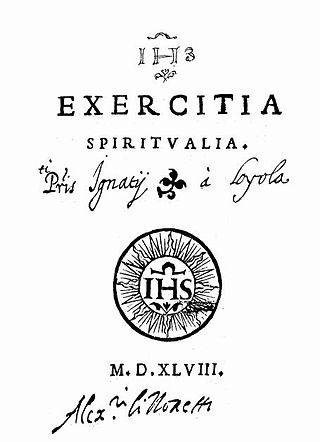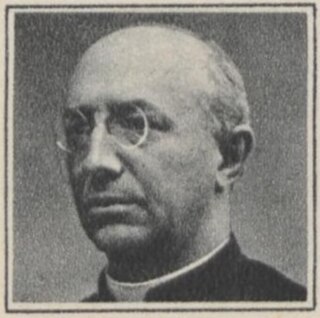Related Research Articles

The Society of Jesus, also known as the Jesuit Order or the Jesuits, is a religious order of clerics regular of pontifical right for men in the Catholic Church headquartered in Rome. It was founded in 1540 by Ignatius of Loyola and six companions, with the approval of Pope Paul III. The society is engaged in evangelization and apostolic ministry in 112 nations. Jesuits work in education, research, and cultural pursuits. Jesuits also conduct retreats, minister in hospitals and parishes, sponsor direct social and humanitarian ministries, and promote ecumenical dialogue.

Regimini militantis Ecclesiae was the papal bull promulgated by Pope Paul III on September 27, 1540, which gave a first approval to the Society of Jesus, also known as the Jesuits, but limited the number of its members to sixty.

Friedrich Spee was a German Jesuit priest, professor, and poet, most well known as a forceful opponent of witch trials and one who was an insider writing from the epicenter of the European witch-phobia. Spee argued strongly against the use of torture, and as an eyewitness he gathered a book full of details regarding its cruelty and unreliability. He wrote, "Torture has the power to create witches where none exist."

Luis Martín García was a Spanish Jesuit, elected the twenty-fourth Superior General of the Society of Jesus.

The Spiritual Exercises, composed 1522–1524, are a set of Christian meditations, contemplations, and prayers written by Ignatius of Loyola, a 16th-century Spanish Catholic priest, theologian, and founder of the Society of Jesus (Jesuits).

The Ratio atque Institutio Studiorum Societatis Iesu, often abbreviated as Ratio Studiorum, was a document that standardized the globally influential system of Jesuit education in 1599.

Antonio Possevino was a Jesuit protagonist of Counter Reformation as a papal diplomat and a Jesuit controversialist, polemicist, encyclopedist, and bibliographer. He was the first Jesuit to visit Muscovy, Sweden, Denmark, Livonia, Hungary, Pomerania, and Saxony in amply documented papal missions between 1578 and 1586 where he championed the enterprising policies of Pope Gregory XIII.

Charles-Thomas Maillard de Tournon, also known as Carlo Tommaso, was a papal legate and cardinal to the East Indies and China.
The Monumenta Historica Societatis Iesu (MHSI) is a collection of scholarly volumes on critically edited documents on the origin and early years of the Society of Jesus, including the life and writings of St Ignatius of Loyola.
MHSI may stand for:

Ignatius of Loyola, venerated as Saint Ignatius of Loyola, was a Basque Spaniard Catholic priest and theologian, who, with six companions, founded the religious order of the Society of Jesus (Jesuits), and became its first Superior General, in Paris in 1541.
Apparatus ad omnium gentium historiam is a bibliographical guide first published in 1597 and written by Antonio Possevino.

Cornelius Nicolaas Petrus Wessels was a Dutch Jesuit, known for his historical works on the early Catholic Missions in Central Asia, specially Tibet, and in the East Indies.

Édouard René Hambye, was a Belgian Jesuit missionary priest in the Indian subcontinent, and a leading scholar on the history of Indian churches. Hambye is the author of Christianity in India, and a contributor to The St. Thomas Christian Encyclopaedia of India. He was often published under the name E. R. Hambye, and in India was anglicized as "Edward".
Ernest Joseph Burrus (1907–1991) was a Jesuit and a leading historian of northwestern New Spain, particularly the Baja California peninsula and Sonora. He made notable contributions by editing many accounts of the Jesuit period from European archives.
Juan Alfonso de Polanco, SJ was a Spanish Jesuit priest. From 1547 to 1556, he was the secretary of Ignatius of Loyola and one of his closest advisers. Later, he was the secretary of the first two superiors general of the Society of Jesus after Loyola, Diego Laynez, and Francis Borgia. He also chronicled the early history of the Jesuits.

Rodrigo de Arriaga was a Spanish philosopher, theologian and Jesuit. He is known as one of the foremost Spanish Jesuits of his day and as a leading representative of post-Suárezian baroque Jesuit nominalism. According to Richard Popkin, Arriaga was “the last of the great Spanish Scholastics”.

Juan de Castillo was a Jesuit priest and missionary, and a martyr-saint of the Catholic Church. A Spaniard, he was one of the first to labor at the Jesuit reductions in Paraguay.
Niccolò Paccanari was an Italian Catholic priest and the founder of the Society of the Faith of Jesus.

Jeremiah O'Connor was an American Catholic priest and Jesuit who served as the president of Boston College from 1880 to 1884. Born in Dublin, he emigrated to the United States as a boy and eventually studied at Saint Joseph's College. He entered the Society of Jesus in 1860. In his later years, he served in parochial roles in New York City.
References
- 1 2 3 ARSI website, Publications
- ↑ JStor website, Luis Martín García, the Jesuit General of the Modernist Crisis (1892-1906): On Historical Criticism, article by David G. Schultenover, published in The Catholic Historical Review, Vol. 89, No. 3 (Jul., 2003), pp. 434-463
- ↑ JHIA website
- 1 2 Historia Domus website, ARSI’
- ↑ ARSI website, Journal AHS